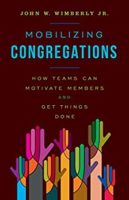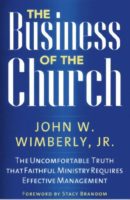
Many congregations belong to and support denominations, both financially and through their leaders’ service on denominational boards, committees, and teams. The identity of many congregations remains rooted in denominational affiliation: Methodists still feel a strong tie to John Wesley; Presbyterians to the basic principles of Calvinism, and so on. But denominations have become less important to congregations and their leaders, and face declining revenue as a result. How might regional and national bodies become more effective in the future?
Denominations remain an important factor in the lives of many congregations. But clergy and lay leaders often have difficult relationships with their denomination. They may disagree with their denomination’s public statements about social, political, and economic issues. Or they may dislike various policies such as whether an associate pastor can become the head of staff or whether an interim ministry must follow the departure of a pastor. Even with such tensions, denominations remain an important factor in the lives of many congregations.
Many congregations live as though the 20th century never ended—and so do most denominations. As financial contributions decline, denominational bodies endlessly reorganize—which only diminishes their ability to offer programs and maintain large staffs. Making decisions based on diminishing financial resources rather than on a positive sense of purpose for the future is a flawed strategy.
Facing reality
The first step to healthy denominational life is to admit the obvious: denominations will not play the central role they once did in the lives of congregations:
- For decades, many congregations looked to denominational leaders for guidance. The hierarchy set the tone for everyone. As denominational leaders became involved in the pursuit of civil rights, women’s rights, poverty issues, etc., congregational leaders felt a need to take those issues seriously.
- Congregations looked to the denomination for everything from Sunday School curricula to stewardship programs.
- Congregations carried out their national and international mission through denominational mission agencies.
- Clergy curried the favor of denominational leaders hoping that would lead to calls to bigger congregations.
Gone are those days! Instead, denominations face a much less friendly situation:
- Today, social justice initiatives are more likely to begin in congregations and work their way up to denominational bodies. The sanctuary movement, for example, started at the grass roots.
- Toward the end of the 20th Century, many congregations realized that non-denominational education, stewardship and other resources were often superior to those produced by denominations. As a result, many denominations struggled to sell enough of their materials to sustain the effort.
- In an internet-connected world, where travel to Africa, Asia and Central America has become affordable, congregations began to develop their own mission projects, often without help from denominational officials.
- Today, lay leaders depend less on denominational officials for guidance as to who their next pastor might be. Indeed, if they have the financial resources, they may well hire an independent company specializing in clergy placement.
- Many clergy today would rather attend the board meeting of a local non-profit working on a pressing social or economic problem rather than attend a board meeting of a denominational judicatory.
Such changes have led to the decline in local revenues that congregations share with regional and national denominations, and to the cycle of endless reorganization and downsizing that we see today.
Responding to the Changes
How have denominations responded to the changing ministry landscape? In too many instances, they have adopted a “rearrange the chairs on the deck of the Titanic” strategy. The motivating force in response to a changing context for ministry has been financial restraints rather than a search for new purpose and direction.
Too many judicatories look at their budget every year and ask, “How many staff and programs do we have to cut this year?” They make needed adjustments to balance their budgets and repeat the ritual the next year and the year after that. There seems to be no willingness to acknowledge and plan for the reality that finances will continue to decline.
As a result of these annual staff purges, denominational staff are, in most cases, dispirited and depressed. They don’t know whether they or the programs they run will be around next year. Denominations aren’t really rearranging deck chairs—they are pushing the chairs off the deck one at a time!
What regional and national denominations need most urgently is a discernment process to discover a new purpose. Their most pressing question shouldn’t be the state of their budgets. It is, “What is God calling us to do today on the national or regional level?”
A New Sense of Purpose
Once there is clarity of organizational purpose, a denomination can mobilize its resources to fulfill that purpose. Leaders can align staff, finances, and governance systems around their newfound purpose instead of annually straining to discover purposes that might justify existing staff and programs. New realities will be generated by a vision of what God wants the denomination to do and to become.
Historically, mainline denominations had small staffs. Large denominational offices arose during the middle of the 20th century—a blip on the longer timelines of Christianity, Judaism and other faith groups. With a purpose-driven approach, denominations may realize they need fewer staff members of denominational programs to achieve the mission in the 21st Century. The large staffs and programs of the 20th Century denominational staffs will be viewed as relics from the past.
It is not time for denominations to reorganize. It is time for them to engage in a profound discernment process to determine the very nature of their existence. What is our purpose in 2020 and beyond? Until that question is answered and acted upon forcefully, denominational structures will continue the depressing dance of downsizing. It doesn’t have to be that way.
John Wimberly is an experienced pastor and consultant. As a consultant, he has worked with congregations and judicatories on strategic planning, staff designs for the 21st century, and congregational growth as well as financial and administrative management. He has MBA, MDiv, and PhD (theology) degrees. His books focus on effective management and leadership. John believes congregations can have a bright future!



